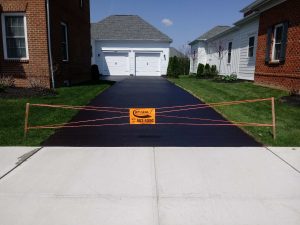Optimize Investment Returns: Angled Parking Area Excellence with Asphalt Sealing
Optimize Investment Returns: Angled Parking Area Excellence with Asphalt Sealing
Blog Article
Hot Mix Asphalt: A Sustainable Service for Pavement
Warm Mix Asphalt (HMA) has arised as a leading sustainable option for sidewalk options, providing a myriad of environmental advantages and cutting-edge innovations. Its capacity to recycle products and lower power consumption provides an engaging situation for its adoption in road building jobs. The long-lasting performance and toughness of HMA make it a favored option for framework growth. As the demand for eco-friendly building methods grows, exploring the subtleties of HMA's sustainability can provide important insights into the future of pavement remedies.
Environmental Advantages of Hot Mix Asphalt

In Addition, Hot Mix Asphalt aids to reduce urban warm island impacts. Its dark shade soaks up sunlight, minimizing the quantity of warm mirrored back into the atmosphere contrasted to lighter-colored pavements. This can reduce ambient temperatures in city locations, decreasing the demand for a/c and ultimately reducing power intake.
Furthermore, Warm Mix Asphalt contributes to enhanced stormwater administration. Its porous nature enables water to infiltrate the pavement and charge groundwater supplies, lowering runoff and the threat of flooding. These environmental advantages make Hot Mix Asphalt a lasting selection for leading highways and roads.
Energy Performance in HMA Production
Is power effectiveness an essential consider the manufacturing of Warm Mix Asphalt (HMA)? Absolutely. Power plays a significant duty in the production of HMA, impacting both price and ecological sustainability. One essential aspect of energy efficiency in HMA manufacturing is making use of cozy mix asphalt (WMA) modern technologies (hot mix asphalt). WMA enables the blending and positioning of asphalt at lower temperature levels compared to conventional hot mix asphalt, leading to decreased power consumption during manufacturing. This procedure not just reduces gas use however also lowers greenhouse gas discharges, making it a much more environmentally friendly alternative.
Moreover, advancements in plant technologies have actually caused even more energy-efficient HMA production procedures. Modern plants are created with attributes like recycled asphalt sidewalk (RAP) processing capacities, effective heater systems, and enhanced insulation, all adding to energy financial savings. By enhancing energy usage in HMA manufacturing, the market can reduce its carbon impact while maintaining top quality pavement products. Energy performance is, consequently, a vital factor to consider in guaranteeing the sustainability of Hot Mix Asphalt production.
Recyclability of Hot Mix Asphalt
The recyclability of Hot Mix Asphalt (HMA) is a critical aspect of its sustainability and lasting environmental impact. HMA is just one of one of the most recycled products in the USA, with over 100 million lots of redeemed asphalt pavement (RAP) being recycled each year in new sidewalk building and construction. Recycling HMA uses numerous environmental benefits, such as reducing the demand for virgin materials, reducing power intake throughout production, and decreasing the quantity of waste sent out to land fills.
The process of recycling HMA entails crushing the existing pavement, crushing it into smaller sized items, and mixing it with new aggregate and asphalt binder to develop a recycled mix. Overall, the recyclability of HMA plays a significant function in advertising lasting practices within the pavement industry.

Long-Term Performance of HMA
Asphalt sidewalks demonstrate sturdiness and durability over an extended duration, mirroring the lasting performance of Hot Mix Asphalt (HMA) In addition, innovations in HMA modern technology, such as the usage of polymer-modified binders and cozy mix asphalt, have actually better improved the resilience and longevity of HMA sidewalks. By focusing on high quality building and upkeep practices, HMA continues to show itself as a lasting and cost-efficient option for lasting pavement framework.

HMA: Sturdiness and Sustainability
Showing both resilience and sustainability, Hot Mix Asphalt (HMA) has actually become a keystone in the building and construction of resilient pavement frameworks - commercial parking lot paving. HMA's longevity originates from its capacity to hold up against hefty tons, rough weather condition problems, and high traffic quantities, making it a reliable option for highways, highways, and airport runways. The composition of HMA, which typically includes accumulations, binder, and filler, plays a critical duty in improving its long life and resistance to use and tear
Additionally, HMA's sustainability depends on its recyclability and energy-efficient production process. The ability to recycle reclaimed asphalt sidewalk (RAP) in new HMA combinations minimizes the demand for virgin materials and decreases the environmental effect of sidewalk construction and upkeep. Additionally, the power effectiveness of producing HMA exists in its reduced blending temperatures compared to various other pavement products, leading to reduced energy intake and greenhouse gas discharges.
Verdict
In verdict, hot mix asphalt (HMA) provides a lasting service for pavement with its environmentally friendly qualities. HMA's recyclability, power performance in manufacturing, and long-term durability make it an environmentally friendly selection for road building and construction.
HMA is one of the most recycled materials in the United States, with over 100 million heaps of reclaimed asphalt pavement (RAP) being recycled annually in brand-new pavement construction.The process of reusing HMA entails milling the existing pavement, crushing it into smaller items, and mixing it with new accumulation and asphalt binder to create a recycled mix.Asphalt pavements demonstrate longevity and durability over an extensive duration, reflecting the long-lasting efficiency of Warm Mix Asphalt (HMA) Additionally, improvements in HMA modern technology, such as the usage of polymer-modified binders and commercial parking lot paving cozy mix asphalt, have actually even more boosted the resilience and longevity of HMA sidewalks. The capacity to reuse recovered asphalt sidewalk (RAP) in brand-new HMA blends minimizes the demand for virgin materials and minimizes the environmental influence of pavement building and maintenance.
Report this page